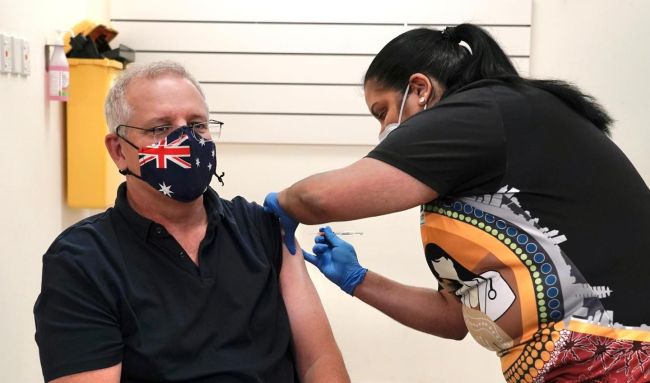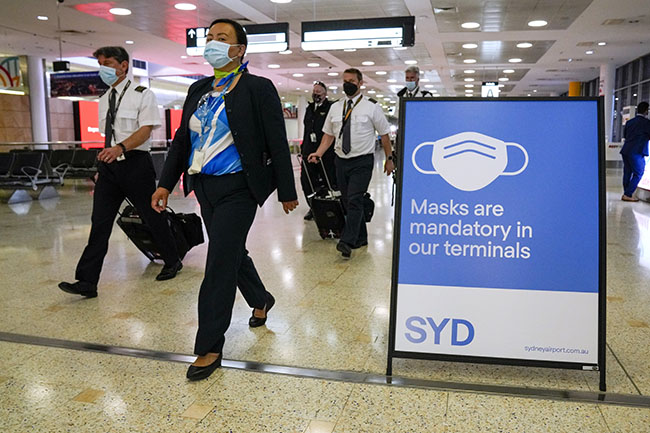Selected
- Details
- Written by Grant Broadcasters
- Category: Selected
- Hits: 132

The World Health Organisation's chief scientist has urged people not to panic over the emergence of the Omicron coronavirus variant and says it is too early to say if vaccines would be need to be reworked.
Speaking in an interview at the Reuters Next conference, Soumya Swaminathan said it was impossible to predict if Omicron would become the dominant strain.
Omicron has gained a foothold in Asia, Africa, the Americas, the Middle East and Europe and has reached seven of the nine provinces of South Africa, where it was first identified.
Many governments have tightened travel rules to keep the variant out.
Swaminathan said Omicron "was highly transmissible" and cited data from South Africa showing the number of cases doubling daily.
"How worried should we be? We need to be prepared and cautious not panic because we're in a different situation to a year ago," she said.
"Delta accounts for 99 per cent of infections around the world. This variant would have to be more transmissible to out-compete and become dominant worldwide. It is possible but it's not possible to predict."
Much remains unknown about Omicron, which has been detected in more than two dozen countries as parts of Europe grapple with a wave of infections of the more familiar Delta variant.
"We need to wait, lets hope it's milder... but it's too early to conclude about the variant as a whole," Swaminathan said.
Among 70 cases reported in Europe that included information on disease severity, half of the patients had no symptoms and half had mild symptoms, according to a report on Thursday by the European Centre for Disease Prevention and Control.
There were no cases of severe disease, hospitalisation or death.
However, the European agency said it would require data on hundreds of cases to accurately assess disease complications, estimating that could take several weeks.
In addition, most cases detected in Europe so far have been in younger people who were fully vaccinated, making them less likely to suffer severe illness.
The UK Health Security Agency said on Friday that the fully vaccinated accounted for 60 per cent of the 20 Omicron infections in the country traced where vaccination status was known, with the unvaccinated accounting for 30 per cent and 10 per cent having had one dose.
Israel's Health Ministry said on Friday it had confirmed seven cases of the variant.
Four of the confirmed Omicron cases are unvaccinated individuals who had recently returned from South Africa, officials said.
The other three include two people who returned from South Africa and from the UK and who had received two doses and a booster shot of the Pfizer-BioNTech vaccine.
The third person returned from Malawi and had been inoculated with the AstraZeneca vaccine.
Australia and the US have reported community transmission of the new variant.
Almost 264 million people have been reported to be infected by the coronavirus since it was first detected in central China in late 2019 and 5.48 million people have died, according to a Reuters tally.
In the United States, President Joe Biden's administration announced measures to guard against the virus spreading.
From Monday, international air travellers arriving in the United States will have to have obtained a negative COVID-19 test within a day of travel.
"We're going to fight this variant with science and speed, not chaos and confusion," Biden said.
Aside from wreaking havoc in the travel industry, the clampdown has pounded financial markets and undermined major economies just as they were beginning to recover from the lockdowns triggered by Delta.
Bank of England policymaker Michael Saunders , who voted for an interest rate hike last month, said on Friday he wanted more information about Omicron before deciding how to vote this month.
"At present, given the new Omicron COVID variant has only been detected quite recently, there could be particular advantages in waiting to see more evidence on its possible effects on public health outcomes and hence on the economy," Saunders said in a speech.
Germany said it would bar the unvaccinated from all but essential businesses, and controversial legislation to make vaccination mandatory would be drafted for early next year.
Several countries, including the UK and the US, were bringing forward plans to offer booster shots but, like travel bans, they are disputed.
Many scientists say the way to stop the virus spreading is to make sure poorer countries have access to vaccines, not to give blanket booster shots to people in richer countries.
with AP
© RAW 2021
Image: https://pixabay.com/illustrations/omicron-virus-corona-coronavirus-6833018/ (free image)
- Details
- Written by Grant Broadcasters
- Category: Selected
- Hits: 132

Supermarket giant Coles is being hauled to court accused of shortchanging more than 7500 workers by $115 million.
The Fair Work Ombudsman alleges Coles underpaid 7812 employees between January 2017 and March 2020, some of them by up to $471,647.
The $115.2 million relates mainly to overtime entitlements for salaried managers at supermarkets and liquor stores in each state and territory.
Forty-five managers were allegedly underpaid by more than $100,000.
Coles will face the Federal Court accused of unlawfully failing to keep proper records including those related to employees' overtime hours.
"Businesses paying annual salaries cannot take a 'set-and-forget' approach to paying their workers," Fair Work Ombudsman Sandra Parker said on Thursday.
"Employers must ensure wages being paid are sufficient to cover all minimum lawful entitlements for the hours their employees are actually working and the work they are actually doing."
The legal action stems from Coles' disclosure last year to the Australian Securities Exchange it was reviewing the pay of award-covered and salaried employees.
It is accused of significantly underestimating how much money employees were owed. Fair Work said more than $108 million remained outstanding.
Coles faces penalties of up to $63,000 per breach proven.
The company said it had apologised to affected team members and incurred $13 million in remediation costs, with another $12 million set aside.
"To the extent that further remediation may be required, we will update the market accordingly," Coles said.
© AAP 2021
Image: Elly2001, CC BY-SA 4.0 <https://creativecommons.org/licenses/by-sa/4.0>, via Wikimedia Commons
- Details
- Written by Grant Broadcasters
- Category: Selected
- Hits: 98

Scott Morrison has stressed he is not "spooked" by the Omicron variant, insisting the new COVID-19 strain would not put Australia back into lockdown.
The prime minister said a two-week pause on the next stage of Australia's reopening plan was sensible in order for health experts to assess the risk posed by the new variant.
Visa holders, which were set to be allowed into Australia on December 1, will now have to wait until December 15 to enter the country without an exemption.
Omicron had also delayed travel bubble arrangements for citizens from Japan and South Korea.
Federal, state and territory leaders will meet later on Tuesday afternoon for an urgent national cabinet meeting to discuss the Omicron variant.
"We have taken sensible precautions for a two-week pause for the next steps," Mr Morrison told question time on Tuesday
"As we continue to face these new variants of concern, and it is a variant of concern, we've dealt with many before."
The prime minister said it was crucial state and territory leaders stick to their reopening plan, despite the Omicron variant raising anxieties about the virus.
"We're not going back to lockdowns, none of us want that," Mr Morrison said.
"What we did last night was protecting against that, by having a sensible pause."
The Australian Technical Advisory Group on Immunisation is also examining whether to recommend booster COVID-19 shots sooner in light of the variant.
They are currently recommended for six months after a second vaccine dose.
Home Affairs Minister Karen Andrews said Omicron would lead to new challenges in Australia.
"It's very early days and the world is yet to have a complete understanding of it, we need to know more about it," she told parliament.
"(The two-week pause) was not a decision the government took lightly...we took this decision based on the health advice."
Health Minister Greg Hunt stressed the Omicron variant was one that would be able to be managed.
"All of this is done on the presumption that we will recommence from December 15, but medical advice will guide our decision making throughout," he said.
Leaders at national cabinet will receive updates on Omicron, with the prime minister set to inform state and territory leaders about actions taken by the federal government on the variant.
Mr Morrison said he wanted to ensure leaders were "on the same page" about Omicron.
It comes as the latest vaccine figures revealed an additional 95,000 doses were administered on Monday.
It took the total population over 16 being fully vaccinated to 87 per cent, while 92.4 per cent have had their first dose.
More than 430,000 people have received their booster dose.
Victoria has reported 918 new daily infections and six more deaths.
NSW recorded 179 additional cases and three more deaths on Tuesday.
There were six new cases in the ACT.
© AAP 2021
Image: Scott Morrison Facebook
- Details
- Written by Grant Broadcasters
- Category: Selected
- Hits: 116

A flight crew walk through the terminal at Sydney Airport, Monday, Nov. 29, 2021 (AP Photo/Mark Baker)
Omicron has arrived in Australia after two overseas travellers - possibly three - arrived in Sydney with the new coronavirus variant.
Almost 150 people have arrived in NSW from southern African countries where the new Omicron COVID-19 variant is running rampant, with three possible cases among them.
Genomic testing on Sunday confirmed two overseas travellers who arrived in Sydney have been infected with the new coronavirus variant.
Both passengers were asymptomatic when they arrived on Saturday night and are in isolation in the Special Health Accommodation. Both are fully vaccinated.
NSW Premier Dominic Perrottet said a third person possibly has the variant, with 141 people having come to the state from the nine countries of concern over the past 24 hours.
All have been sent to hotel quarantine for 14 days.
Although he has ordered all international arrivals to quarantine at home for 72 hours, Mr Perrottet insisted the NSW international and state borders would remain open.
"Ultimately we need to open up to the world (and) we need to do so safely," he told reporters on Monday.
"We don't need to have a knee-jerk reaction, we need to have a proportionate and balanced response to the situation that's in front of us."
The three-day quarantine order is on top of a federal government requirement for travellers to enter quarantine for two weeks if they have been in South Africa, Lesotho, Botswana, Zimbabwe, Mozambique, Namibia, Eswatini, Malawi or the Seychelles in the past 14 days.
Mr Perrottet also stressed NSW was better equipped to confront new variants.
"We've got to learn to live alongside the variants of the virus that come our way," he said.
"And the vaccination rate here is one of the highest in the world.
"That is not the case in the southern African nations."
The premier has said there are no plans to adjust the state's reopening roadmap, so restrictions will still ease for the unvaccinated on December 15.
Meanwhile, the state added 150 new infections to its caseload on Monday.
For the fifth consecutive day, no new deaths were reported.
Hospitals are treating 170 patients, five more than the previous day, including 25 people in intensive care.
NSW is 94.5 per cent single-dosed for everyone 16 and over, while 92.4 per cent are fully vaccinated.
Of 12- to 15-year-olds, 81.3 per cent have received one jab and 76.5 per cent both.
© AAP 2021
Page 115 of 191